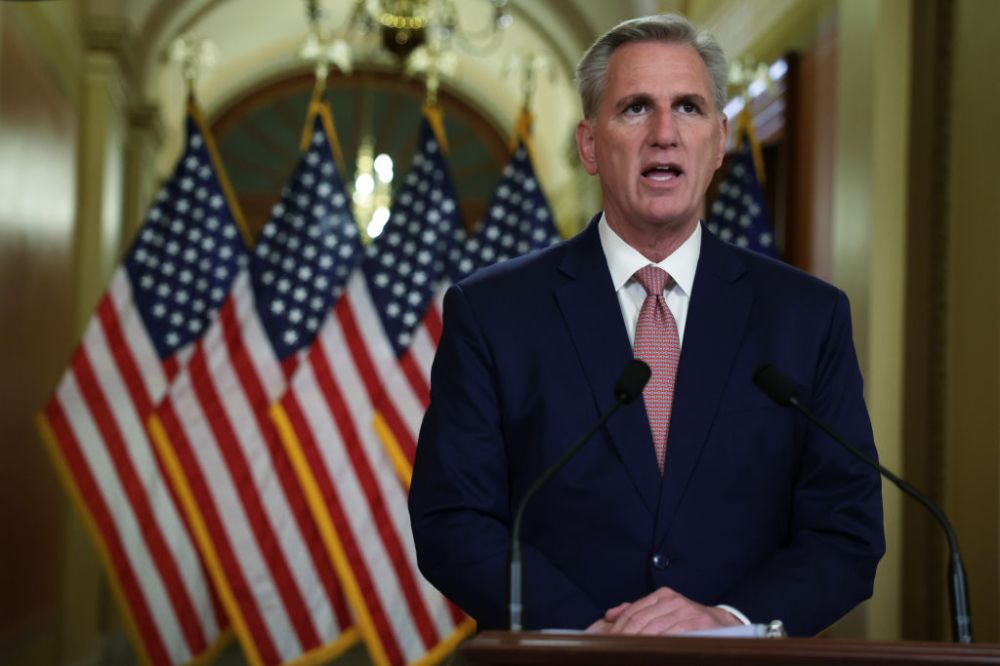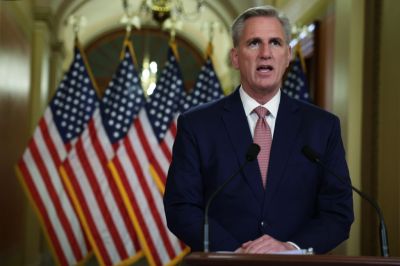Nearly a year after Russia launched its bloody war against Ukraine, American lawmakers still broadly support aiding the country’s defense. But the growing rift between a vocal, isolationist group of Republicans and the rest of the party suggests Ukraine assistance packages could face serious hurdles in the new Congress.
With Republicans controlling the House, future aid is an open question. House Speaker Kevin McCarthy has vaguely said the chamber won’t advance blank checks to Ukraine, suggesting future spending will at least have more robust oversight provisions attached. But some of his members want to cut off Ukraine funding entirely, as they also seek to drastically reduce federal spending this year.
Eleven House Republicans, led by Florida Rep. Matt Gaetz, introduced a “Ukraine Fatigue” resolution last week calling for an end to America’s assistance to the country. And on Thursday, Missouri Sen. Josh Hawley delivered a speech at the Heritage Foundation arguing the American military is overextended. Instead of arming Ukraine, he said, U.S. resources should be diverted to Taiwan and the Pacific to counter aggression by the Chinese government.
The speech—which outlined Hawley’s idea of a “nationalist foreign policy”—was the culmination of months of such comments from Hawley.
“They want us to believe our military might is infinite, that American power faces no real constraints, and that we ought to use it to reshape the world,” Hawley said Thursday. “They want us to believe we can fight an endless proxy war in Ukraine and somehow, some way, none of this will deter our ability to stop China from invading Taiwan or deter our ability to stop China elsewhere.”
“We are overcommitted,” he added. “Our elites are deluded by the dream of liberal empire.”
Lawmakers from both parties have been alarmed by how quickly the war in Ukraine has used up weapons stockpiles, largely because the defense industry is facing supply chain pitfalls and isn’t prepared to match demand. Congress took steps in last year’s defense authorization package to boost production—but that will take some time.
Even as they agree on the need to bolster the defense-industrial base, most Republicans would differ with Hawley’s assertion that America is overcommitted. Some, like Arkansas Sen. Tom Cotton, hold positions that are diametrically opposed to Hawley’s. Cotton this week urged the Biden administration to send weapons, like cluster munitions, that officials have been hesitant to share. Cotton says they would give Ukraine an edge on the battlefield.
And a bipartisan group of five lawmakers sent a letter to President Joe Biden Thursday asking the administration to share F-16 fighter aircraft with Ukraine.
House Foreign Affairs Committee Chairman Mike McCaul, meanwhile, is actively laying groundwork for more Ukraine aid, telling the Associated Press this week that American resources to the country are “not a question of either or” in relation to other priorities. The fight will likely heat up as appropriations season begins. Lawmakers face a September 30 deadline to fund the government.
Senate Minority Leader Mitch McConnell has also been a staunch supporter of arming Ukraine. He departed this week with a group of senators to attend a high-profile international security conference in Munich, where Ukraine will be at top of mind.
“Defeating the Russians in Ukraine is the single most important event going on in the world right now,” McConnell said on Fox News this week.
The United States has spent roughly $113 billion on Ukraine-related priorities since the start of the war. Much of that has been direct military assistance to Ukraine, but it also includes pools of money to replenish American military equipment or provide humanitarian aid to the millions of people displaced by the war. Lawmakers most recently passed a $45 billion Ukraine aid package in December. That is expected to last for some time, although a renewed Russian offensive could accelerate requests for more funding.
Sen. Mike Rounds, a South Dakota Republican who serves on the Armed Services Committee, told The Dispatch Thursday that success in Ukraine would help deter a fight over Taiwan from even happening.
“This is a judgment call,” he said in response to Hawley’s speech. “We’ve decided that using our resources to protect a friend in Ukraine sends a message to the rest of the world that we are serious about other countries attacking innocent neighbors.”
Utah Sen. Mitt Romney agreed: “The clearest message that can be sent to China about their intent for Taiwan is to show that the world is committed to preventing an invasion of a sovereign nation as Russia has done Ukraine.”
He further argued in a brief hallway interview Thursday that the war is exposing military industrial complex deficiencies and thus “helping us become more prepared, not less so.”
Making that case to voters is getting more challenging, though. An Associated Press-NORC Center for Public Affairs Research poll released this week found waning public support for providing weapons to Ukraine. In May 2022, 60 percent of U.S. adults favored sending weapons to Ukraine. That number is down to 48 percent in the new poll.
Romney blames right-wing media voices for that shift.
“When Tucker Carlson says we shouldn’t be helping Ukraine, then you’re going to have a lot of people just follow that without giving it a good deal of consideration,” he said. “But frankly, you do what’s right and don’t worry about the polls.”
Of Note






Please note that we at The Dispatch hold ourselves, our work, and our commenters to a higher standard than other places on the internet. We welcome comments that foster genuine debate or discussion—including comments critical of us or our work—but responses that include ad hominem attacks on fellow Dispatch members or are intended to stoke fear and anger may be moderated.
With your membership, you only have the ability to comment on The Morning Dispatch articles. Consider upgrading to join the conversation everywhere.